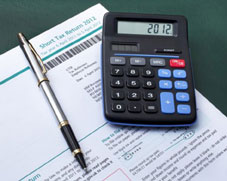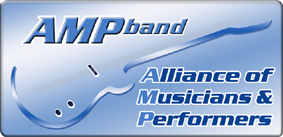Your tax return - a necessary evil
 The dreaded envelope will drop on most
doormats in March or April so in this 'Ask Dave' we are taking a simple and
brief look at that delightful publication known as the 'Self Assessment' tax
return. You may need to have a strong cup of coffee at the ready!
The dreaded envelope will drop on most
doormats in March or April so in this 'Ask Dave' we are taking a simple and
brief look at that delightful publication known as the 'Self Assessment' tax
return. You may need to have a strong cup of coffee at the ready!
If
you earn money from your music, whether full or part-time, then you should
be registered as self employed with HMRC and will need to complete a self
assessment tax return. If you're new to self-employment let HMRC know as
soon as possible - even if you already fill in a Self Assessment tax return
each year. If you don't tell them, you may have to pay a penalty.
Registration is quick and painless and can be completed on line (that's the
easy bit!).
Any income, however small, is required by law to be
declared to HM Revenue & Customs (HMRC). In a partnership, both partners
need to register.
You can choose whether to complete your self
assessment online or by the paper and post method. It's worth bearing in
mind that the return dates are different for each method; the deadline is
31st October for posted forms and 31st January for online submissions
(following the end of the tax year).
If, after the first year, HMRC
consider your finances to be straightforward, you will receive the short tax
return in future which is a lot easier and quicker to complete. This
decision is down to the 'powers that be' at HMRC and cannot be requested by
an individual.
Although not a requirement, it is advisable to have a
separate bank account for your music/band business. Keeping personal and
business monies separate will make it easier to verify your income and
expenditure. Monies taken out of the business account (your profit) would be
labeled as 'drawings'.
What does the taxman need to know:
Quite simply, you need to declare any income during that tax year and any
business purchases and expenses. You are taxed on your earnings minus any
qualifying expenditure (i.e. your profit). That may sound simple...But this
is HMRC we are talking about so unfortunately it's not quite as
straightforward as that so read on...
When calculating your
expenditure, remember to include things such as:
• Office equipment
• Clothing purchased specifically for your performance (logoed items,
tuxedo or dress suit etc)
• Fuel & vehicle running costs
• Guitar
strings, drum sticks, sheet music
• Attending shows (classed as
education and covers meet ups, conferences, seminars and music shows)
•
Advertising & Promotion of your band
• Consumables such as stationery,
Gaffa tape, lamps etc
• Business account bank charges, interest on loans
for capital expenditure
Working from home incurs business costs. You
are not entitled to claim mortgage, council tax or internet connection for
your property as HMRC determines that you would have to pay these whether
you had a business or not. You can, however, claim a proportion of utility
costs as business expenses such as telephone bill, heating and lighting. You
would need to justify the proportion you have chosen if questioned by HMRC.
Keeping records will help your case if investigated.
For larger items
that you use in your band you can claim over a few years rather than just
the year you bought the item. This can be useful if your profits are lower
than your expenditure in that year.
Items that fall under capital
expenditure are those larger items that will be an asset to your business
over the next few years such as a vehicle (see further info below), drum
kit, guitars, amps, speakers etc. To claim 100% in any one tax year (First
Year Allowance), it must be below the Annual Investment Allowance (AIA).
This amount varies from year to year (and sometimes even during the tax
year). Between 2012 and 2015 it had gone from £100,000 down to £25,000 then
up to £250,000.
If an item is used for personal as well as business
(such as a vehicle) you can only claim a percentage. For example, you buy a
van for £10,000, about 40% of the time it is used for personal things such
as shopping or days out. In this example, you would only be able to claim
£6,000 capital allowance (AIA - Annual Investment Allowance). You decide on
the percentage, but bear in mind, if the taxman questions your decision you
will have to justify your figures and if you can't then be prepared for
back-tax, interest etc.
When calculating your capital allowance,
remember to carry forward any outstanding amount from the previous year.
This is where you need to reach for the caffeine ... or alternatively
consult with an accountant who will be aware of 'main pools', 'special rate
pools', 'small pools' and depreciation. With reference to vehicles,
different rates apply dependent on CO² emissions, when the vehicle was
purchased, whether it's a car or commercial vehicle etc. More information on
capital allowances can be found at
https://www.gov.uk/capital-allowances
What records to keep:
Keeping detailed and comprehensive records
of your business finances will not only make filling in the self assessment
easier, but could also save you money in the long run. It is also your
lifesaver as HMRC can ask to see your evidence at any time.
The
documents you should be able to provide if asked are:
• Cashbooks
•
Invoices/ Record of Income
• Mileage records
• Bank statements
•
Receipts for purchases
• Your P60s if you are also employed
In
addition to paperwork related to your business, keep records of any other
income such as interest from savings, capital gains, income from property,
income from employment and any state benefits. You will need these for
filling in the self assessment statement.
As a self-employed person
you will need to keep all these records for at least 6 years.
If
your income (not just profit) exceeds (currently) £85,000 you will also need
to register for VAT. As this will not apply to our members (and those who
are VAT registered would usually employ the services of an accountant) we
will not expand further on this thrilling topic.
Whilst you can
complete a self assessment form yourself, it is always advisable to use the
services of a professional accountant to ensure that you receive all your
entitlements and do not pay more tax than necessary.
Are you still
awake? Good! And finally, if you are ever in doubt, use the self assessment
helpline on 0845 9000 444. Where tax is concerned, HMRC aren't very
susceptible to excuses, so it is much better to get it right first time.
The information provided in this article has been referenced from
www.hmrc.gov.uk and is correct as of the date of publishing. (Please be
aware that HMRC continually move the goal posts). Another useful source of
information is www.gov.uk
